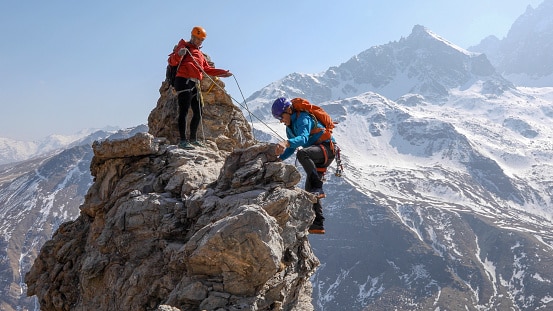Mountaineering is a challenging and exhilarating outdoor activity that involves climbing up mountains or other steep and rugged terrain. It requires physical and mental strength, endurance, and technical skills to navigate through different kinds of terrain, from rock faces to glaciers and snowfields. Mountaineering can be a solo pursuit, but it is often done as a team activity, with climbers relying on each other for safety and support.
Mountaineering has a rich history, with some of the earliest known climbs dating back to the 18th century. Over time, the sport has evolved, and climbers have pushed the boundaries of what is possible. Today, mountaineering encompasses a range of activities, from peak bagging to high-altitude climbing on the world’s tallest peaks.
One of the most significant challenges of mountaineering is the inherent danger. Climbing on steep and rugged terrain carries the risk of falling, avalanches, rockfall, and other hazards. As a result, climbers must be well-trained and well-equipped, with a keen understanding of the risks involved.
Despite the risks, mountaineering offers a unique sense of achievement and adventure. Climbers often speak of the sense of awe and wonder they experience when standing on top of a mountain, looking out at the world below. Mountaineering can also provide a deep sense of connection with nature, as climbers traverse through some of the world’s most stunning landscapes.
In recent years, mountaineering has become more accessible to the general public, with a growing number of guide services and outfitters offering trips and courses for beginners. However, it is important to remember that mountaineering is still a challenging and risky activity, and should only be undertaken with proper training, preparation, and respect for the environment.
Overall, mountaineering is an exciting and rewarding pursuit for those who are willing to put in the effort and take the risks. With proper training and preparation, climbers can experience some of the world’s most beautiful and awe-inspiring landscapes, while pushing themselves to their physical and mental limits.
Click here to show the answer
2. What skills do mountaineers require?
Click here to show the answer
3. Is mountaineering typically done alone or in a group?
Click here to show the answer
4.. What is the most significant challenge of mountaineering?
Click here to show the answer
5. What do climbers experience when standing on top of a mountain?
Click here to show the answer
6. Mountaineering should not be undertaken without proper training and what?
Click here to show the answer
7. What can mountaineering provide in addition to adventure and achievement?
Click here to show the answer
8. What main physical attribute is required for mountaineering?
Click here to show the answer
9. What kind of peaks are climbed in mountaineering?
Click here to show the answer
10. What do climbers rely on each other for during mountaineering?
Click here to show the answer

